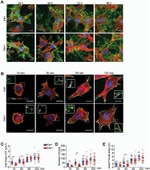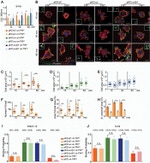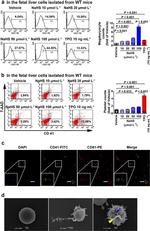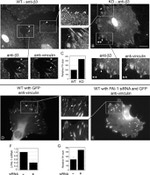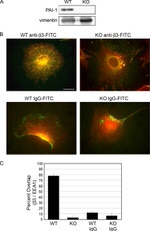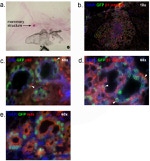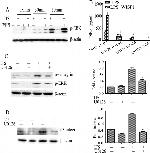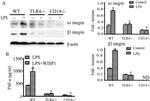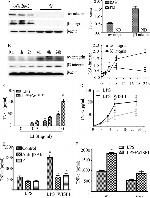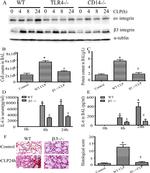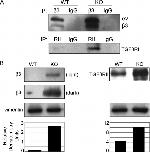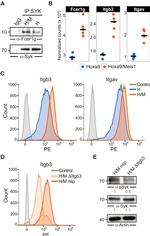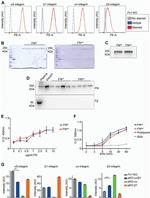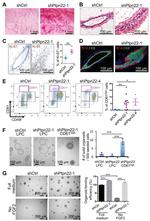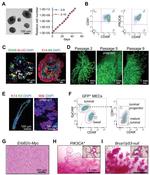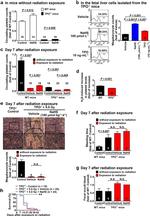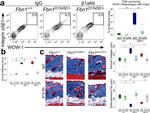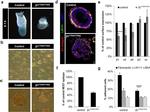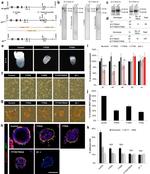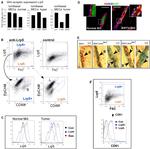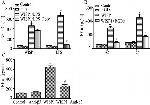Search Thermo Fisher Scientific
Invitrogen
CD61 (Integrin beta 3) Monoclonal Antibody (2C9.G3), Functional Grade, eBioscience™
Product Details
16-0611-82
Species Reactivity
Published species
Host/Isotype
Recommended Isotype Control
Class
Type
Clone
Conjugate
Form
Concentration
Purification
Storage buffer
Contains
Storage conditions
Shipping conditions
RRID
Product Specific Information
Description: The 2C9.G3 (HMb3-1) monoclonal antibody reacts with mouse and rat CD61, also known as the integrin beta3. CD61 is expressed by activated T cells, granulocytes, and platelet. CD61 associates non-covalently with two integrin alpha subunits; alphaV (CD51) to form Vitronectin Receptor and alphaIib (CD41) to form gpIIb/IIIa. These heterodimeric complexes are responsible for adhesion to extracellular matrix components including fibrinogen, fibronectin, fibronectin, vitronectin, thrombospondin and von Willebrand factor.
Applications Reported: The 2C9.G3 antibody has been reported for use in flow cytometric analysis. 2C9.G3 has also been reported in blocking of ligand binding and some adhesive processes.
Applications Tested: The 2C9.G3 antibody has been tested by flow cytometric analysis of mouse splenocytes and bone marrow cells. This can be used at less than or equal to 0.5 µg per test. A test is defined as the amount (µg) of antibody that will stain a cell sample in a final volume of 100 µL. Cell number should be determined empirically but can range from 10^5 to 10^8 cells/test. It is recommended that the antibody be carefully titrated for optimal performance in the assay of interest.
Storage and handling: Use in a sterile environment.
Filtration: 0.2 µm post-manufacturing filtered.
Purity: Greater than 90%, as determined by SDS-PAGE.
Endotoxin Level: Less than 0.001 ng/µg antibody, as determined by LAL assay.
Aggregation: Less than 10%, as determined by HPLC.
Target Information
CD61 (GPIIIa, ITGB3) is a glycoprotein found on megakaryocytes, platelets and their precursors. CD61 antigen plays a role in platelet aggregation and also as a receptor for fibrinogen, fibronectin, von Willebrand factor and vitronectrin. CD61 is a 105 kDa glycoprotein that associates with either the alpha 11b integrin (CD41) or the alpha V integrin (CD51) at the cell surface. CD61 is expressed on platelets and megakaryocytes in association with CD41, and on endothelial cells, monocytes, platelets and osteoclasts in association with CD51. CD61 is a receptor for fibrinogen, fibronectin, Von Willebrand Factor, vitronectin and thrombospondin. The CD61 protein product is composed of an alpha chain and a beta chain. A given chain may combine with multiple partners resulting in different integrins. CD61 is found along with the alpha IIb chain in platelets. Like other integrins, CD61 is known to participate in cell adhesion as well as cell-surface mediated signaling. Diseases associated with CD61 dysfunction include Glanzmann Thrombasthenia and Platelet type-16 Bleeding Disorder.
For Research Use Only. Not for use in diagnostic procedures. Not for resale without express authorization.
Bioinformatics
Protein Aliases: CD61; GPIIIa; integrin beta 3 (Cd61); Integrin beta-3; platelet gpIIIa; Platelet membrane glycoprotein IIIa
Gene Aliases: CD61; GP3A; INGRB3; Itgb3
UniProt ID: (Rat) Q8R2H2, (Mouse) O54890
Entrez Gene ID: (Rat) 29302, (Mouse) 16416

Performance Guarantee
If an Invitrogen™ antibody doesn't perform as described on our website or datasheet,we'll replace the product at no cost to you, or provide you with a credit for a future purchase.*
Learn more
We're here to help
Get expert recommendations for common problems or connect directly with an on staff expert for technical assistance related to applications, equipment and general product use.
Contact tech support
-Functional-Grade-Flow-20170216130641.jpg?time=20220826)
-Functional-Grade-Flow-20170216130641.jpg?time=20220826)
